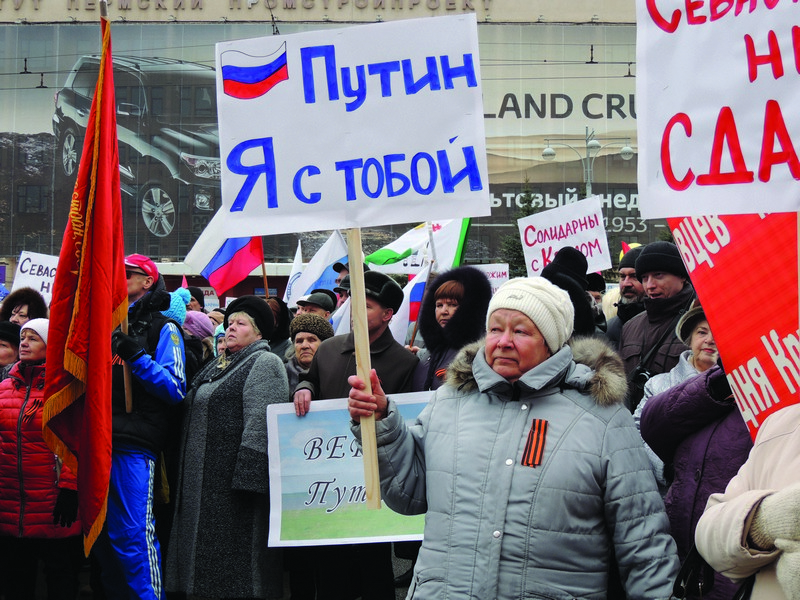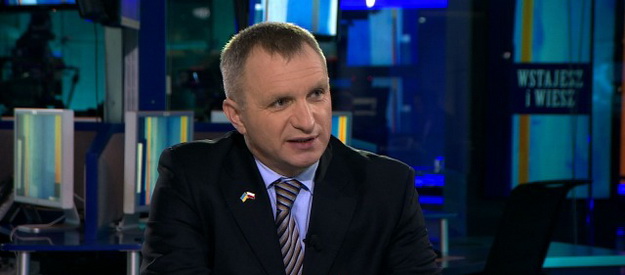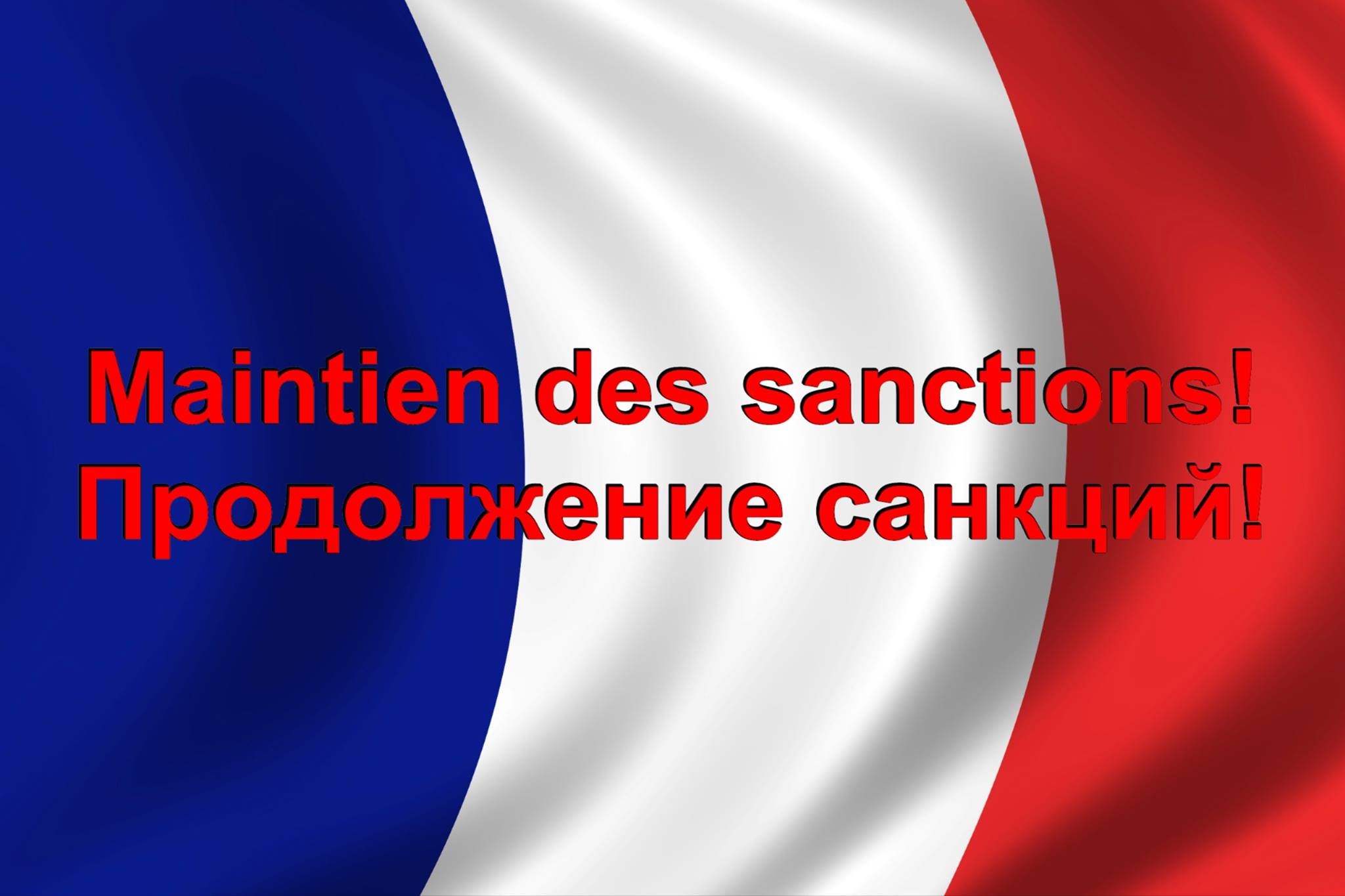Two analysts recently addressed support for Putin among Russia’s diaspora communities against the backdrop of a longstanding tendency of Russians to support powerful leaders. Igor Yakovenko deconstructs this tendency in arguing that the only way to erode support for Putin is to show that he is, in fact, weak. Kseniya Kirillova responds, adding her own insights into the cultural and political factors she sees driving support for Putin.

In his article entitled “Servility without fear or reproach,” appearing in Chicago’s Russian-émigré newspaper Seven Days, Yakovenko examines a specific attribute of Russian thinking he calls “ur-servility,” being driven by a desire to please those above them. He compares people who wrote denunciations during Stalin’s days with the servility he observed in the questioners of Putin during his recent television Q and A show “Direct Line.” Yakovenko states that there’s a great temptation to assume that servility during the Stalin era was the result of fear, at a time when there were real risks of being shot or imprisoned. However, he contends, “people forget that Stalinist servility was not maintained by fear alone.”
As evidence of non-coercive servility, Yakovenko points to the interviews of displaced persons after World War II, former Soviet citizens who were well beyond the reach of Stalin’s coercive security forces, but who nonetheless “overwhelmingly remained within the framework of the culture of servility with its cult of a leader before whom they slavishly humbled themselves.”
Yakovenko suggests the reason for this is ur-servility, which he considers a phenomenon of Russian life and Russian daily life and political culture not only in the past but throughout the ages and still a vital element of Russian culture today. He defines the phenomenon as a sincere devotion to and irrational love for Russian leaders together with the approval of the most criminal manifestations of their policies, attitudes held by Russian émigrés today, even those who have long since left Russia.
“That ur-servility is still a vital attribute of Russian culture as evidenced by the fact that a significant portion of the émigrés who left the USSR in the 1980s and Russia in the 1990s and live today in European countries and the US are devoted fans of Putin, support all his adventures, including the annexation of Crimea, the war in eastern Ukraine, and the mass murder of citizens of Syria who happen not to be terrorists.” Moreover, since they are located outside the physical bounds of Russia, their servility cannot be explained as ‘getting into a master’s good graces‘ or ‘trying to please.’ He contends that Russian émigrés don’t behave this way out of fear of Russian authorities, since they are well beyond their reach. “What we see then is a crystal-clear distillation of a servility that is not a consequence of fear or reproach,” Yakovenko concludes.
He further points out that servility to Putin among the Russian diaspora communities in Europe, the US and Israel is irrational. In Israel, for example, he states support for Putin is particularly irrational because Putin openly supports Israel’s enemies. “Émigré ur-servile Putinism is something absolutely irrational and directed against the interests of its followers,” who “just like the Putinists in Israel are destroying their own homeland,” Yakovenko says.
He continues by observing that the flip side of servility is “doublethink,” which is a kind of disconnect between reality and thought, typically involving hypocrisy or double standards. “These are two sides of a single Russian political and cultural life,” he argues. The difference between Soviet times and today is that in the USSR there was an ideology. In Putin’s Russia, there is no ideology and doublethink means mostly the difference between what one says and what one actually does. An example of doublethink is the Russian elite denouncing the West while at the same time sending their children to Western universities.
Yakovenko points out that the common thread in Russian servility throughout history is “recognizing not the truth of ideas but the truth of force.” As a result, giving Russians more or new information to “open their eyes” doesn’t lead to their changing their minds. They will invariably be drawn to support the powerful one. Consequently, he argues, Putin must be shown to be fundamentally weak in order to lose the support of Russians, at home and abroad.
 In a comment for Radio Svoboda named “Servility and Guilt,” Kseniya Kirillova responded to Yakovenko’s thesis and added some important insights of her own on Putin supporters among diaspora communities, pointing to both external Kremlin manipulations as well as internal psychological vestiges of the Soviet experience. “In my opinion,” she argues, “in addition to having absorbed irrational habits of obedience and admiration for cult forces characteristic of the Russian mentality, the Kremlin has also played a significant role in applying skillful manipulative tactics to contribute to this phenomenon (at least in its present manifestation).”
In a comment for Radio Svoboda named “Servility and Guilt,” Kseniya Kirillova responded to Yakovenko’s thesis and added some important insights of her own on Putin supporters among diaspora communities, pointing to both external Kremlin manipulations as well as internal psychological vestiges of the Soviet experience. “In my opinion,” she argues, “in addition to having absorbed irrational habits of obedience and admiration for cult forces characteristic of the Russian mentality, the Kremlin has also played a significant role in applying skillful manipulative tactics to contribute to this phenomenon (at least in its present manifestation).”
She points to her previous work on the manipulative nature of widespread Kremlin propaganda, where she highlights that’s its potency is grounded in the use of false associations, stereotypes, and particular psychological patterns which are exploited powerfully by Russian authorities to their fullest at home and abroad. She contends that propaganda explains in part the significant number of Putin supporters inside Russia and among the Russian diaspora, particularly in the United States.
Kirillova goes on to share her personal experience both in Russia and in the US to make interesting observations about the interplay of guilt, envy linked to deprivations that may be driving the phenomenon of servility to Putin. “It’s worth noting,” she states, “this support of Russian leadership among those members of the diaspora is often accompanied by a sincere hatred of their country of residence.” She finds it striking that Russian émigrés who support Putin invariably also show a disdain for their new home, in this case, in America.
Kirillova also points out the sharp contrast between the disdain Russian émigrés have toward their new countries and the unequivocal love Russia’s dissidents in Russia exhibit toward Russia.
“Contrary to the propaganda about Russian human rights activists being members of some ‘fifth column,’ a few years before emigrating, I have personally spent time among civil and political activists, and having come to know them quite well, I can honestly say that I never once came across anyone who hated his country. Of course, this was before the war in Ukraine and before the rampant political repression of the human rights community which was comprised of all sorts of people, even casual supporters, but there were no haters, no deliberate enemies who wanted to harm Russia, not a single one.”
She continues with an observation about Russians in the US. “The first time I saw people who sincerely with all their heart hated the country in which they lived, and want to see it ruined, was here in the US, among the Russian diaspora. I found this especially strange, given that many Russians here already have US citizenship, some even political asylum (!). Many live on welfare or earn good salaries and have no intention of going back home. Yet their only desire is to talk about how wonderful it will be when Russia destroys ‘those damned Yanks.'”
Kirillova argues that the roots of this phenomenon lie in large part in the lack of a tradition of civil society in Russia as well as in what she calls “horizontal” relations. By these she refers to the fact that many Russians abroad are involved in organizations created by the Kremlin, especially those affiliated with the Russian consulates and missions. She believes an incentive for these kinds of associations is a lingering attitude toward emigres as “traitors to the motherland,” an attitude instilled in Russia of the last decade with the same tenacity as during the Soviet era. “If you left, then you’re a traitor” is so “deeply ingrained in the subconscious of many people that it has created a completely illogical sense of guilt,” Kirillova states. Even before all the current anti-American propaganda, many Russians left Russia for quite commonsense and personal motives, yet, “the guilt remained in their subconscious.”
Kirillova has written previously that because concepts of private property or independent courts are weak and not revered in Russia, people do not feel protected by the law. As a result, Russians tend to look to the State as a pillar of stability for one’s loyalty. “For many Russians – except, of course, for those who consciously chose the path of dissent, acknowledging one’s conflict with the state is quite a traumatic.” They see their decision to leave Russia as simply choosing to “reap the benefits of the civilized world, and earn more money.” They were not prepared to”carry the label of “traitors”. Thus for these emigres, they welcome opportunities to associate with organizations created by the Kremlin abroad such as those tied to Russian missions and consulates. “Participating in the life of such organizations is practically the same as officially restoring ties with one’s former homeland, and allows one to feel more confident that no one has the right to call them traitors,” Kirillova states.
In addition, Kirillova finds that ordinary, banal envy also play a significant psychological role in doublethink, which she further contends is an attribute of a troubled society. She observes, “envy is common among many Russians, and the worst thing about it is, it does not disappear when one acquires material wealth.” She shares a common joke among Russians to demonstrate how US Putinists think today: “How did such a clean, rich, well-kept country like America, end up belonging to Americans?”
The sense of deprivation is so intense, states Kirillova, that “even owning your own home and maintaining all the appearances of the American way of life cannot break this feeling of deprivation.” Russian émigrés feel that they and their parents grew up such starkly different and terrible conditions compared to their new homelands, they experience a sense of guilt and envy that the beauty around them is “the product not of their culture but of someone else’s.” “Perhaps this is where the origins of what Yakovenko describes as the practices of Russian émigrés that lead to thoughts of the destruction of their new homeland.” concludes Kirillova, using a typical phrase expressing this envy: “I don’t mind if things are bad for me, as long as they are worse for somebody else.”
Kirillova concludes with the observation that the cult of power, the support of force over ideas, becomes the compensation for those deeply ingrained feelings of deprivation. “Ok, so we don’t know how to build or create things, but at least we are strong,” and “I didn’t have an American childhood, but at least I have two countries, both of whom recognize me.” “Such are the unconscious motives of ‘disinterested lackeys,'” Kirillova says of the servile Russians Yakovenko refers to. In the final analysis, servility, she concludes, cannot fairly be called purely disinterested or unselfish because it in fact fulfills an important interest among the Russian diaspora. It allows Russian émigrés to feel a sense of moral superiority over the objects of their envy which surround them in their new countries.
Related:
- Putin’s reign of terror: “Cossacks” attack Navalny, women & children as Russia’s police watch
- Ever more Russians are at risk of repression as Putin’s Russia heads toward totalitarianism
- Putin’s Russia well on its way to ‘criminal neo-totalitarianism’ with a ‘neo-terror’ and a ‘neo-GULAG,’ Pastukhov says
- Totalitarianism and the personality cult: 15 years of Putin’s reign in texts and opinions








